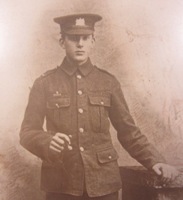
Photograph of Harry in Tameside Local Studies and Archives Centre. Reference: MR3/17/136

(L to R) 1914-15 Star; Allied Victory Medal
Harry was born between April and June 1896 in Pemberton, on the outskirts of Wigan in Lancashire. His father was called Will and his mother was Charlotte. He had 2 older siblings: Thomas and Priscilla, and 2 younger: Hilda and George. The family had lost one other child by 1911, but we don't know their name.
We don't know where Harry grew up, but in 1911 the family lived at 219 Billinge Road in Pemberton. Will, Thomas and Harry were all coal miners, although we don't know whether they all worked in the same mine. Will was a fireman, which was a senior position. He would be responsible for safety and smooth operations in an area of the mine. Thomas operated a coal cutting machine, and Harry, who was only 14, was a shunt minder. He will have assisted with the movements of wagons on the railway tracks at the mine.
The First World War broke out in August 1914 and Harry joined the Army in early October. He enlisted in the 5th Battalion of the Manchester Regiment. This was his local Territorial Force unit, based in Wigan. Before the war many of its members were miners, so Harry might have already known some of the men he would serve with. He was given the service number 2640.
On the outbreak of war members of the 5th Battalion were called into the Army for full-time service and left their civilian jobs. The battalion was sent to Egypt on the 10th September and arrived on the 25th. Harry began his training at their headquarters in Wigan. New recruits like him were formed into a 'second line' for the battalion that could be used to replace casualties. We don't know anything about Harry's training.
The 5th Battalion took part in the invasion of Gallipoli and landed on the 6th May 1915. They were soon in the front line and taking casualties. Harry was a member of the '1st Draft' that was sent out to reinforce them. He left the UK in early June.
By the 11th June Harry had reached Malta. He wrote a letter home to his parents telling them that they had had 'some champion weather since we left Plymouth and we couldn't have wished for a steadier voyage.' It would appear that Harry was not allowed ashore in Malta, because he told his parents 'I don't know how hot it is on land but we are nearly roasted in the daytime on the boat'. He told his parents not to 'send me cigs or anything because I have touched somebody else up for them'.
Harry arrived in Gallipoli on the 22nd June and joined A Company of the 5th Battalion. He went straight into the front line trenches, as he wrote on the 23rd: 'we are now in the trenches for a bit, I will write when I come out'. Harry asked them to 'send some writing paper'.
On the 2nd July Harry told his parents that 'we haven't had much to do with the Turks yet but they are getting battered. We are still in the trenches doing a bit. I haven't had a letter yet but perhaps one is on the way'.
Harry wrote several times, each time hoping that the postcard would 'find all well as it leaves me at present'. He had 'seen plenty lads from ...Pemberton but Bill Winstanley is dead'. This was Private 1562 William Winstanley, who had been killed on the 5th June. On the 8th July Harry asked 'How are they taking it about Bill Winstanley. I have seen his grave a time or two'. At that time he was 'still in the trenches doing a bit and you must let all know I am going on alright as I can't write to them till some envelopes come.'
At some point towards the end of July Harry was wounded. We don't know anything about what happened to him. He died at sea on the 27th July 1915, aged 19. We believe he was being evacuated from Gallipoli to a hospital elsewhere aboard a hospital ship when he died.
Harry has no known grave, so he was most likely buried at sea. He is commemorated on the Helles Memorial in Turkey. Harry's name can be found between Panel 158 and 170.
Thomas, or Tom as Harry called him, also joined the Army. He served as a Private in the Royal Army Medical Corps with the service number 11035. In June 1915 Harry wrote to him at Number 17 Casualty Clearing Station at Hazebrouck in northern France. Will and Charlotte would move to 285 Billinge Road by the end of the war.
As well as his 1914-15 Star and Allied Victory Medal, Harry was also awarded the British War Medal for his Army service.




